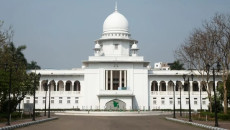
Hafiz Masum Ahmed Dudorchoki
30 March, 2024 22:51
The practices, significance, and rules of the last 10 days of Ramadan

During the last 10 days of Ramadan, Hazrat Muhammad (peace be upon him) spent his time in a special way. The holy month of Ramadan is a month of great fortune for Muslims. It brings them liberation, mercy, and above all, a guarantee of salvation from Hell. While the entire month of Ramadan is filled with virtues, the virtues of its last ten days are even greater. Because it contains a unique night, better than a thousand months, and includes several special characteristics and deeds.
Below, some insight is provided on this topic:
1. During the last ten days of Ramadan, there is a night called "Laylatul Qadr," which is better than a thousand months. Whoever worships with faith and sincerity on this night, their past sins will be forgiven.
Allah says: "Indeed, We sent the Qur'an down during the Night of Decree. And what can make you know what is the Night of Decree? The Night of Decree is better than a thousand months." (Surah Al-Qadr: 1-3)
Significance of Laylatul Qadr: Allah has honored this night above all other nights. He has mentioned it with praise in His words. He has informed us about this night with His revelation. He said in His Book: "Indeed, We sent it down during a blessed night. Indeed, We were to warn [mankind]." (Surah Ad-Dukhan: 2-3)
The blessed night refers to "Laylatul Qadr." Allah has described it as blessed because it is filled with blessings and goodness.
The main reasons for the blessings of Lailatul Qadr are:
(a) On this night, the Quran was revealed.
(b) On this night, decisions regarding all important matters are made and presented to the angels by Allah from the Preserved Tablet for implementation.
(c) Another special feature of this night is that Allah has revealed a complete Surah (Surah Al-Qadr) about this night, which will be recited until the Day of Judgment.
(d) This night is better than a thousand months, meaning its value is greater than eighty-three years.
(e) Angels descend on earth during this night, bringing mercy, blessings, and goodness.
(f) Forgiveness of sins and wrongdoings.
The virtues of this night are described in Hadith: The Prophet Muhammad (peace be upon him) said, "Whoever stands in prayer during Lailatul Qadr with faith and hoping for its reward will have their past sins forgiven." [Bukhari and Muslim]
Hazrat Aisha (may Allah be pleased with her) narrated that during the last ten days of Ramadan, the Prophet Muhammad (peace be upon him) used to tighten his waist belt (i.e., work harder) and spend the nights in worship, and would awaken his family for prayers. [Bukhari and Muslim]
Tightening his waist belt means he would seclude himself from his wives during these days.
During these nights, the Prophet Muhammad (peace be upon him) would exert more effort and time in worship, which was not seen on any other night. For example, Hazrat Aisha (may Allah be pleased with her) narrated that during these nights, the Prophet Muhammad (peace be upon him) would engage in reciting the Quran, making dhikr, performing prayers, and supplications until the time of pre-dawn meal (suhoor). [Muslim]
One special characteristic of these ten days is that the Prophet (peace be upon him) used to observe I'tikaf in the mosque during these ten days. Without necessity, he would not leave the mosque.
Observing I'tikaf, Definition of I'tikaf: To stay in the mosque or a secluded place (for women) with special intention for the sake of Allah's obedience is called I'tikaf.
Why is I'tikaf performed? Observing I'tikaf in the last ten days of Ramadan is a great form of worship. Hazrat Aisha (may Allah be pleased with her) said, "The Prophet Muhammad (peace be upon him) used to observe I'tikaf in the last ten days of Ramadan." [Bukhari and Muslim]
So Allah grants us the opportunity to benefit from this valuable Sunnah of the Prophet (peace be upon him). The mosque is the house of Allah, and to sit near the Owner's house as a petitioner is an extremely fortunate matter.
Virtues of I'tikaf: I'tikaf is a great worship. During his time in Madinah, the Prophet (peace be upon him) observed I'tikaf every year. Despite being busy with preaching, jihad, teaching, and other activities, he still observed I'tikaf every Ramadan. I'tikaf is a school of self-purification and spiritual development, which reflects the illuminated guidance of the Prophet (peace be upon him). In the state of I'tikaf, a person separates themselves from all worldly matters and focuses solely on worshiping Allah, striving for continuous closeness to Him. I'tikaf is an opportunity for enhancing faith. Everyone should take advantage of this opportunity to strengthen their faith and strive to reach higher levels of consciousness.
The Holy Quran mentions various aspects of I'tikaf, mentioning the story of Hazrat Ibrahim and Hazrat Ismail (peace be upon them) - 'And I ordered Ibrahim and Ismail, to sanctify My house for those who circle it, retreat there for worship, bow and prostrate themselves.' [Surah Al-Baqarah: 125]
Regarding the behavior with wives during the state of I'tikaf, Allah says, 'And do not have relations with them (your wives) as long as you are staying for worship in the mosques.' [Surah Al-Baqarah: 187] Numerous Hadiths describe the practice of I'tikaf, among them.
Below are mentioned some Hadiths related to the virtues:
1- Hazrat Aisha (RA) narrated that the Prophet (SAW) observed Itikaf during the last ten days of Ramadan until his death. Afterward, his wives also observed Itikaf. [Bukhari and Muslim]
2- Hazrat Aisha (RA) narrated that the Prophet (SAW) used to observe Itikaf during the last ten days of every Ramadan. [Bukhari, Hadith 2041]
Another Hadith states:
3- The Prophet (SAW) said, "I used to observe Itikaf during the first ten days (of Ramadan). Then I observed Itikaf during the middle ten days (of Ramadan). Then I was told: 'There is a night among the nights of Ramadan which is equivalent to a thousand months, so whoever performs Itikaf during it, believing in Allah and seeking His rewards, will be forgiven his previous sins.' Thereupon the Prophet (SAW) observed Itikaf during the last ten days of Ramadan and said, 'Look for it in the last ten nights of Ramadan.' " [Musnad Ahmad, Abu Dawood: Hadith 1174, Muslim]
4- Hazrat Huraira (RA) narrated that both durations (ten days and twenty days) are mentioned in two Hadiths. He said, "The Prophet (SAW) used to observe Itikaf for ten days every Ramadan, but in the year he passed away, he observed Itikaf for twenty days." [Sahih Bukhari]
5- Hazrat Aisha (RA) said, "The Prophet (SAW) observed Itikaf with his wives during the last ten days of Ramadan until he died. His wives observed Itikaf after his death, and he was in the state of I'tikaf when he passed away." [Bukhari]
6- The Prophet (SAW) said, "I observed Itikaf during the first ten days (of Ramadan). Then I observed Itikaf during the middle ten days (of Ramadan). Then I was told: 'There is a night among the nights of Ramadan which is equivalent to a thousand months, so whoever performs Itikaf during it, believing in Allah and seeking His rewards, will be forgiven his previous sins.' Thereupon the Prophet (SAW) observed Itikaf during the last ten days of Ramadan and said, 'Look for it in the last ten nights of Ramadan.' " [Muslim]
Benefits of I'tikaf:
Waiting for Another Prayer: The person observing I'tikaf waits for another prayer after completing one, and there are many virtues associated with this waiting. Abu Huraira (may Allah be pleased with him) narrated that the Prophet Muhammad (peace be upon him) said, "Indeed, angels make supplication for one of you as long as he remains in the place where he has prayed, and they say, 'O Allah, forgive him! O Allah, have mercy on him!' as long as he does not break his ablution." [Sahih Bukhari and Muslim]
Seeking Laylat al-Qadr: The person observing I'tikaf remains in seclusion during the last ten nights of Ramadan, as Laylat al-Qadr, the Night of Decree, could be any of these nights. Due to this mystery, Allah has kept it hidden from His servants so that they may search for it throughout the month.
Strengthening Relationship with Allah: Through I'tikaf, one's relationship with Allah becomes stronger, and it reflects the true essence of humility before Allah. Allah says, "And I did not create the jinn and mankind except to worship Me." [Quran, Surah Az-Zariyat: 56] The various rewards of this worship are realized through the state of I'tikaf, as it binds a person entirely to the worship of Allah and fills them with eagerness for Allah's satisfaction. Allah also does not disappoint His servants, as He says, "Say, 'O My servants who have transgressed against themselves [by sinning], do not despair of the mercy of Allah. Indeed, Allah forgives all sins. Indeed, it is He who is the Forgiving, the Merciful.'" [Quran, Surah Az-Zumar: 53]
Allah guides elsewhere: "And when My servants ask you, [O Muhammad], concerning Me - indeed I am near. I respond to the invocation of the supplicant when he calls upon Me. So let them respond to Me [by obedience] and believe in Me that they may be [rightly] guided." [Quran, Surah Al-Baqarah: 186]
When someone begins to prefer staying in the mosque, which is a means of habituating oneself to worship. Because whatever one habituates oneself to, they become inclined towards it. When one starts to prefer staying in the mosque, they will love the mosque, and they will love performing prayers there. Through this process, one's relationship with Allah becomes stronger. Love for prayer will be created in the heart, and one will begin to experience tranquility through the performance of prayers. This tranquility was described by the Prophet (peace be upon him) when he said: "O Bilal! Establish the prayer and give us comfort by it." [Sunan Abi Dawud: 4985]
Through I'tikaf in the mosque, Muslims detach themselves from worldly desires and hence, harshness diminishes within them. Because harshness is created due to love for the world and being engrossed in worldly matters. By detaching oneself in the mosque, love for the world is diminished, and one experiences spiritual development. Through I'tikaf in the mosque, angels make supplication, which leads the person in I'tikaf to ascend spiritually towards the ranks of angels. They ascend not only in rank but also in aspiration. As angels have no worldly desires, they are not ensnared by the trap of worldly desires. And despite having human inclinations, one becomes free from everything and becomes singularly focused on Allah.
Peace comes internally through I'tikaf.
There is more opportunity for reciting the Quran.
There is a chance for sincere repentance.
There is the opportunity to engage in Tahajjud (night prayer).
Time can be utilized effectively.
The heart becomes softened.
It provides a means of salvation from sins.
Rules of I'tikaf: In Islamic jurisprudence, I'tikaf is considered a Sunnah. The most suitable time for I'tikaf is the last ten days of Ramadan, which is proven by the Quran, Hadith, and scholarly consensus.
Imam Ahmad (may Allah have mercy on him) said: "I do not know of any Muslim who denies that I'tikaf is a Sunnah."
Purposes of I'tikaf:Strengthening the relationship with Allah: I'tikaf serves as a means to strengthen the bond with Allah. When a person is drawn towards Allah and becomes centered around Him, through internal refinement and strengthening of faith, it leads to salvation on the Day of Judgment. Thus, I'tikaf is an act of worship through which a person separates themselves from all creation and seeks to be in the presence of the Lord as much as possible. The task of the worshipper is to remember Him, love Him, and worship Him. Constantly striving for His satisfaction and nearness strengthens the bond and relationship with Allah.
Staying away from worldly inclinations and baseless activities: Through fasting, Allah protects His servants from indulging in excessive eating, sexual misconduct, and various other baseless activities. Similarly, through the institution of I'tikaf, He preserves them from engaging in baseless talk, bad company, and excessive sleep.
Unprecedented opportunity for proximity to Allah: Through I'tikaf, a person is wholly dedicated to Allah. By engaging in acts such as prayer, recitation of the Quran, remembrance (dhikr), and supplication (dua), the worshipper experiences an unparalleled opportunity for closeness to Allah.
Seeking Laylat al-Qadr: The primary purpose of I'tikaf during the last ten days of Ramadan is to seek Laylat al-Qadr (the Night of Decree). This is proven by a hadith narrated by Abu Said al-Khudri, in which the Prophet (peace be upon him) said: "I had practiced I'tikaf for the first ten days and then for the middle ten days and then I was told that there was Laylat al-Qadr in the last ten days, so whoever wished to observe I'tikaf with me, he should do so." [Sahih Muslim, Hadith 1167]
Cultivating the habit of staying in the mosque: Through I'tikaf, a person becomes connected to the mosque, developing a habit of being in its vicinity. According to a hadith, among the seven whom Allah will shade under His shade on the Day of Judgment, one is a person whose heart is attached to the mosque. This hadith indicates the virtue and importance of being connected to the mosque. [Sahih Bukhari, Volume 3, Book 29, Hadith 81]
Strengthening willpower and cultivating the habit of abstaining from bad habits and desires: Because through I'tikaf, the tendency to refrain from bad habits is developed. I'tikaf creates a golden opportunity to cultivate patience and strengthen one's willpower. Through I'tikaf, a person emerges as a completely new individual, getting rid of habits that may not benefit them in the future.
Regulations of I'tikaf:
Duration of I'tikaf: The shortest duration of I'tikaf is according to the most authentic opinion, one day and one night. This is because it is not heard that the Companions (may Allah be pleased with them) intended I'tikaf for anything less than this, although there is no specific limit on the maximum number of days for I'tikaf according to the scholars.
Entry and exit time during I'tikaf: If one intends to observe I'tikaf during the last ten days of Ramadan, they should enter the mosque before sunset on the twentieth night, as their purpose is to seek Laylat al-Qadr, which is hoped to be found in the odd nights, one of which is the twenty-first night. However, leaving the mosque after the sunset of the night of the twenty-ninth is also permissible, as it is valid. [Muslim, Fatwa Shamila: 2/452] However, it is better to stay in the mosque until the morning of Eid and then go directly to the Eidgah. However, leaving the mosque after sunset on the night of the twenty-ninth is not a problem and remains valid.
Conditions for I'tikaf: There are several conditions for I'tikaf. Some of the conditions are as follows:
One must be a Muslim to observe I'tikaf, as the worship of non-Muslims is not acceptable.
The person observing I'tikaf must have sound judgment, as the intention behind the actions should be clear, and actions without intention may not be valid.
Knowledge of differentiating between good and bad is necessary, as a person who cannot distinguish between good and bad intentions, their intention is not valid.
One must make the intention for I'tikaf, as staying in the mosque may be for I'tikaf or for some other purpose.
And the need for intention between these two is necessary. The support for this is the hadith: "Actions are but by intention, and every man shall have only that which he intended." [Bukhari: 1]
It is imperative for women in the state of menstruation or postnatal bleeding to become pure before observing I'tikaf, as staying in the mosque in this condition is prohibited, although observing I'tikaf in the state of Istihada is valid.
Guidelines for Itikaf (Spiritual Retreat) in the Mosque
Evidence: Aisha (may Allah be pleased with her) reported that during the time of the Prophet Muhammad (peace be upon him), there was a woman who performed Itikaf (spiritual retreat) in seclusion with him. She used to have a red and yellow tent pitched in the mosque, and we would place a screen for her during the prayer. [Bukhari, Hadith no. 2037]
Performing Ghusl (ritual bath) is obligatory to attain purity from impurities. It is prohibited for impure individuals to stay in the mosque. However, some scholars have stated that under certain conditions, it is permissible for impure individuals to stay in the mosque. If impurity results from sexual contact or conjugal relations, according to most opinions, the Itikaf will be invalidated. However, if it occurs due to a wet dream, according to most opinions, Itikaf will not be invalidated. If it occurs due to masturbation, then according to the correct opinion, Itikaf will be invalidated.
Itikaf should be observed in the mosque: All scholars unanimously agree that Itikaf should be observed in the mosque. However, congregational mosques are preferable because in such a situation, the person performing Itikaf does not have to leave the mosque for Friday prayers. [Fathul Qadir: 2/110, Fatwa Alamgiri: 1/212]
Girls can perform Itikaf by allocating a specific place in their homes. Then they will receive the reward of Itikaf in the mosque. [Bukhari and Muslim, Alamgiri: 1/211, Hasiyatut Tahdhib Alad Durarul Mukhtar: 1/473, Apke Masail Aur Unka Hal: 4/624]
If an individual performing Itikaf leaves the mosque without a valid reason, their Itikaf will be invalidated. [Ad Durarul Mukhtar: 2/447, Fathul Qadir: 2/112]
If leaving the place of Itikaf is necessary for fulfilling human needs, then Itikaf will not be invalidated. [Apke Masail Aur Unka Hal: 4/624, Ad Durarul Mukhtar: 2/445, Hasiyatut Tahdhib: 1/474]
If one cannot attain purity from impurities in the mosque, permission to leave the mosque is granted. [Fathul Qadir: 2/110]
If an individual performing Itikaf needs to go outside for necessities such as using the bathroom or taking meals because there is no provision in the mosque, then permission to go outside is granted. [Fathul Qadir: 2/110]
If the mosque where Itikaf is being observed does not arrange for Friday prayers, it is permissible to leave the mosque for Friday prayers, and it is recommended to perform the four Sunnah rakats of Friday prayer before leaving, so that one can return to the mosque immediately after the prayer. [Fathul Qadir: 2/110, Hasiyatut Tahdhib: 1/475, Alamgiri: 1/212, Apke Masail Aur Unka Hal: 4/624]
Due to an excuse, the individual performing Itikaf may leave the mosque. The evidence from the Hadith narrated by Safiyyah (may Allah be pleased with her) states: "Safiyyah (may Allah be pleased with her) came to the Prophet (peace be upon him) while he was in the state of Itikaf during the last ten days of Ramadan. When the Prophet (peace be upon him) spoke to her for a long time, he stood up to accompany her for bidding farewell." [Bukhari: 2035]
It is not permissible for an individual performing Itikaf to leave the mosque for any good deed, such as visiting the sick or attending a funeral. In this regard, Aisha (may Allah be pleased with her) said, "For the person observing Itikaf, it is Sunnah not to visit the sick, not to attend the funeral, not to touch his wife, to refrain from sexual relations with her, to refrain from sexual intimacy, and to refrain from leaving the mosque except for a dire necessity." [Abu Dawood: 2473]
It is not valid to leave the mosque during Itikaf for any action contrary to Itikaf, such as buying and selling, or conjugal relations. However, if the person observing Itikaf is poor and has nothing to eat at home, then he can engage in buying and selling during the Itikaf period. However, the condition is that he cannot bring merchandise for sale to the mosque. [Ad Durarul Mukhtar: 2/448-449, Apke Masail Aur Unka Hal: 4/625]
For the person observing Itikaf, it is recommended to cover the place of Itikaf with something so that he is not seen. Evidence: "The Prophet (peace be upon him) observed Itikaf in a Turkish tent, the door of which was a mat." [Muslim: 1167]
The person observing Itikaf may bring necessary items with him so that he does not have to leave the vicinity of the mosque repeatedly. Abu Sa’id Khudri (may Allah be pleased with him) narrated that his father said, "The Prophet (peace be upon him) forbade buying and selling in the mosque." [Tirmidhi, Abu Dawood, Musnad Ahmad: 6991]
What the individual observing Itikaf should refrain from: Without a valid excuse, the person observing Itikaf should not engage in any activity that violates the purpose of Itikaf, such as excessive talking, excessive socializing, excessive sleeping, not using the time for worship, etc. The person observing Itikaf should not engage in buying and selling while in the mosque. Proof: Hazrat Amr bin Shuaib (may Allah be pleased with him) described his father's statement that the Prophet (peace be upon him) prohibited buying and selling in the mosque. [Tirmidhi, Abu Dawood, Musnad Ahmad: 6991]
It is permissible for the family of the person observing Itikaf to visit, talk, and interact with him because the wives of the Prophet Muhammad (peace be upon him) used to visit him during his Itikaf. However, lengthy interactions are not desirable.
What the person observing Itikaf should refrain from: Without a valid excuse, the person observing Itikaf should not engage in any activity that violates the purpose of Itikaf, such as excessive talking, excessive socializing, excessive sleeping, not using the time for worship, etc. The person observing Itikaf should not engage in buying and selling while in the mosque.
Proof: Hazrat Amr bin Shuaib (may Allah be pleased with him) described his father's statement that the Prophet (peace be upon him) prohibited buying and selling in the mosque. [Tirmidhi, Abu Dawood, Musnad Ahmad: 6991]
Transactions that involve buying and selling, such as various types of contracts, rent, Mudarabah, Musharakah, keeping a pledge, etc., are considered permissible. However, if transactions occur outside the mosque that do not involve any benefit for the public, then those transactions will be considered invalid.
One should refrain from spitting in the mosque, as narrated by Hazrat Anas (RA). When a Bedouin man once spat in the mosque, the Prophet Muhammad (SAW) said: 'The mosque is not meant for spitting; rather, it is a sacred place for the remembrance of Allah, prayer, and recitation of the Quran.'
Dear readers, let us utilize the month of Ramadan properly and elevate ourselves in the last ten days through Itikaf. Through this, we secure the welfare of both our worldly life and the Hereafter.
May Allah grant us success. Ameen.







 সিলেট সিপিবি সাধারণ সম্পাদক সুমন ‘আটক’
সিলেট সিপিবি সাধারণ সম্পাদক সুমন ‘আটক’ 




 IT Lab Solutions Ltd.
IT Lab Solutions Ltd.
আপনার মন্তব্য